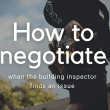In this weeks mailbag, we discuss whether it’s a good idea to make a pre-auction offer.
Read on for tips, advice and a little-known clause that could give you a massive advantage when making an offer pre-auction.
Question: When (is it a good idea) to do a pre-auction offer?
This property is priced within its evaluation range 650-680 price indication. I’d really like the property, but the agent says (any) preauction offer would need to be really good – like 750k.
This is a lovely location. I know the area and want to live in this neighbourhood.
This house has 2 things against it:
1) it’s a stucco-clad home (i will get a building report to include weather tightness)
2) it has a body corp.
Do you think in this market those 2 things will keep other buyers from making a pre-auction offer? Anything I should consider when deciding if I should go to auction or do pre-offer?
Answer:
Congratulations on finding a home you love!
A pre-auction offer can be a great idea as it can reduce your competition drastically. Although depending on your location, the interest on Auction day may not be huge anyway. As an example, most properties in Auckland have 1 or 2 bidders on Auction day at most, many have none. The factors you mentioned (stucco-clad and body corp) could reduce potential competition as well. Although this could be outweighed by other alluring factors like location, views, sun aspect.
I would check more tangible things like, how many people were at the open homes? If they were quiet, eg 1-5 groups, then you are probably unlikely to have loads of competition. If there were 30-40 groups there, then the owners could be pretty bullish about their chances of achieving a good result at Auction.
Agents will always push for a high pre-auction offer. In my opinion, it’s ok to make an offer towards the higher end of where you feel comfortable, but no more than that. The owners open-ness to considering your pre-auction offer will probably depend largely on the amount of interest they have had in the property. Along with how realistic their pricing expectations are.
If they reject it, don’t be put off either. Owners often need a few weeks on the market to understand what ‘realistic’ means when it comes to price.
This article may help you decide where to pitch your offer:
Read: The 5 step home valuation method
Stucco clad is often ok if it is an older property (70’s etc). If it was built in the 90’s or early 2000’s then be extra careful, but I wouldn’t rule it out just because of this. Another article that might be useful (even for buyers):
Read: How to sell a plaster home
How many properties are in the body-corp? Is it run by the owners or a separate company? How old is the development? If it has run smoothly for the last 40 years, then you are probably pretty safe.
The next step would definitely be the builder’s report. I would do this before you make your offer, so you know what maintenance work if any, you need to account for in your budget.
Two key points for a pre-auction offer:
1. If you make a pre-auction offer, the agents will usually try to bring the Auction forward, with your offer becoming the starting bid and the reserve. Other buyers can still outbid you at this point. To counteract this, you could try adding a clause that says:
“By signing and accepting this offer, the Vendors agree to withdraw the property immediately from the market and sell it to (Purchasers name) without calling an Auction or a multi-offer deadline.”
Owners will usually want to see a really good price on the offer to sway them to accept this sort of condition but it does happen. Most buyers just don’t realise they can ask for this. Note: Check the wording of this clause, and the contract in its entirety with your solicitor before you submit it to the agent/owners.
2. If you end up going through to the Auction, watch out for a situation where the Auctioneer is the only one bidding against you. This happens all the time. If they take you into a private room to ‘negotiate’ and offer to tell you the reserve, just be aware that they will likely give you an inflated number.
Remember: The Auctioneer is working to secure the best possible price for the owner and they are professional negotiators.
For example, let’s say you bid to $800k, the Auction pauses, you go into a separate room, and the Auctioneer says to you:
“$800k is not enough to buy the property, you need to pay at least $950k”
Don’t feel like you have to go to that price level if you don’t want to. The real reserve may, in fact, be much lower (it could be $850k, $750k, or $1million for all you know).
You can move a bit if you want to, but if you feel you are at the top of your range, stick to your guns. Don’t be swayed by clever Auctioneers.
At the same time, don’t let a small amount stop you from buying the home you really want if it comes down to it. If they want $10k more than your ideal ‘top price’ to seal the deal, I recommend getting on with it and securing your new home!
Still have questions?
Would you like advice that is specific to your situation? Book a one-on-one skype/phone consultation for $89.











Do you need a loan to pay off your bills? Or for your Business if yes Email us opploansllc@gmail.com
Thanks Andrew, wish I had known this a month ago, but I am still looking so will keep it in mind!
Thanks Andrew, great read. Will be taking this advice with me.